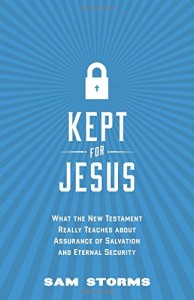 Can I Be Blotted from the Book of Life?
Can I Be Blotted from the Book of Life?
John Piper answers – original source the Bible mentions the phrase ‘the book of life’ about fourteen times, and quite a few of those passages mention getting blotted out of the book of life. How does this NOT mean losing your salvation?” What would you say Pastor John?
When it comes to the doctrine of eternal security or perseverance of the saints, we need to speak with precision. And I think it is not quite precise to say, as Charles does, in quite a few of the Scriptures it mentions you can be blotted out of the book of life. I don’t think it ever says you can be blotted out, at least not in the sense that sometimes God does it. It says we will be blotted out if we fail to meet certain conditions. Now whether that ever happens or in God’s sovereignty can happen is another question. I don’t think so and let me try to show why.
The book of Revelation is the book that refers to this most often and it is the book that has the text that sounds most problematical, I think. Revelation 3:5 says, “The one who conquers will be clothed thus in white garments, and I will never blot his name out of the book of life. I will confess his name before my Father and before his angels.”
Now some say: Well, that is a foolproof text against the doctrine of the perseverance of the saints or eternal security. They assume that when Revelation 3:5 says that God will not erase a person’s name from the book of life, it implies that he does erase some people from the book of life, and that these people would once be born again, justified, saved, and, nevertheless, in the end condemned, lost, and perish. In other words, they lose their salvation on that reading of the verse.
But is that a true assumption?
The promise: “I will not erase his name from the book of life” does not necessarily imply that some do have their names erased. It simply says, to the one who is in the book, and who conquers in faith: I will never wipe your name out. In other words, being erased is a fearful prospect, which I will not allow to happen to those who persevere. In fact, there are two other passages in Revelation that teach that to have your name in the book of life means that you will most definitely persevere and conquer and thus meet the condition not to be blotted out.
Revelation 13:8 says: “And all who dwell on the earth will worship [the beast], everyone whose name has not been written before the foundation of the world in the book of life of the Lamb who was slain.” Now that verse teaches that those whose names are written in the book of life definitely will not worship the beast. That is what it says. In other words, having your name in the book of life from the foundation of the world means God will keep you from folly. He will cause you to persevere in allegiance to God. Being in the book means you will not apostatize. You won’t forsake the faith.
Revelation 17:8 says: “The beast that you saw was, and is not, and is about to rise from the bottomless pit and go to destruction. And the dwellers on earth whose names have not been written in the book of life from the foundation of the world will marvel to see the beast, because it was and is not and is to come.” Now that means having your name in the book of life means you will be kept from marveling at the beast. Those whose names are not written in the book will marvel at the beast, and those whose names are in the book will not marvel. It is infallible as far as the way this author is arguing. To have your name in the book means you won’t marvel, you won’t worship.
So the point is that having one’s name written in the book is effective. It keeps you from making shipwreck of your faith. John does not say: If you worship the beast, your name is erased. He says: If your name is in the book, you will not worship the beast. Now back to Revelation 3:5: “The one who conquers will be clothed thus in white garments, and I will never blot his name out of the book of life.”
Does that mean God erases some people?
No.
The conquering that keeps you from being erased is guaranteed by being in the book. That is the point of Revelation 13:8 and 17:8. Being in the book keeps you from doing what would get you erased from the book if you did it.
Let me say that again. Being in the book, having your name in the book, keeps you from doing — like worshiping the beast — keeps you from doing what would get you erased from the book if you did it. And that is not a contradiction any more than the way Paul is a contradiction when he says: “Work out your own salvation with fear and trembling, for it is God who works in you, both to will and to work for his good pleasure” (Philippians 2:12–13).
It is not nonsense to state the condition: if you conquer, God will not erase your name, and then to state the assurance, if your name is in the book, you will conquer. That is not a contradiction. God’s written down ones really must conquer, really will conquer. They must and they will. One side highlights responsibility, you must. And one side highlights God’s sovereignty, you will.
So the message for us is this: Never, never, never be cavalier or trifling about your perseverance. God uses real warnings to keep us vigilant and to keep us persevering. We are safe. But we are not careless. That is the point. Press on to make salvation your own, as Paul says, because Christ has made you his own (Philippians 3:12).

